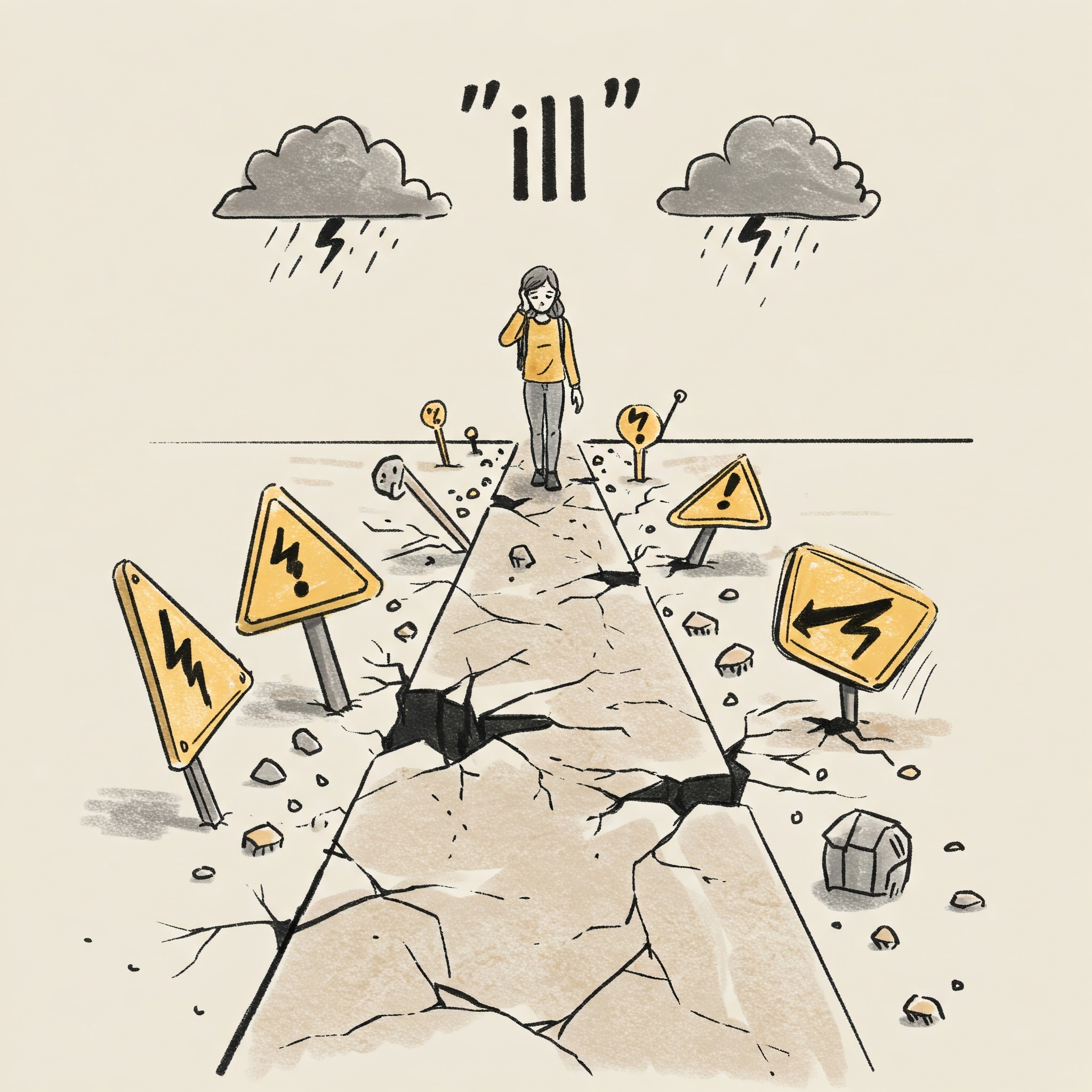Ill
Definition
Ill is an adjective, adverb, and noun. As an adjective, it describes a state of being unwell, sick, or in poor condition. As an adverb, it means poorly or badly. As a noun, it refers to harm, trouble, or an undesirable condition.
Parts of Speech
- Adjective
- Adverb
- Noun
Pronunciation
American English
- IPA Pronunciation: /ɪl/
- Respelling: IHL
British English
- IPA Pronunciation: /ɪl/
- Respelling: IHL
Etymology
The word "ill" originates from Old Norse "illr," meaning "bad, evil, or difficult." It entered Middle English in the 13th century, where it expanded in meaning to include "unwell" or "poorly." Its usage as an adverb and noun developed in later centuries.
Derivatives
- Illness (noun)
- Ill-tempered (adjective)
- Ill-fated (adjective)
- Ill-used (adjective)
- Ill-treated (verb)
Synonyms
- Sick
- Unwell
- Badly
Antonyms
- Well
- Healthy
- Good
Usage
The adjective "ill" is used to describe a state of poor health, e.g., "She has been feeling ill for days." The adverb is used to describe poor performance, e.g., "He was ill prepared for the exam." As a noun, it can describe trouble or harm, e.g., "The reforms aim to address social ills."
Related Terms
- Illness: The state of being unwell or sick.
- Malady: A disease or ailment.
- Affliction: A condition of suffering or distress.
Detailed Definitions
Adjective
- Unwell or sick: Refers to a physical or mental state of poor health.
- Example: "She stayed home because she was feeling ill."
- Unfavorable or harmful: Describes something detrimental or negative.
- Example: "The plan faced ill fortune from the start."
Adverb
- Poorly or badly: Refers to an inferior manner of action.
- Example: "He spoke ill of his colleague."
Noun
- Harm, trouble, or an undesirable condition: Refers to negative outcomes or challenges.
- Example: "They worked to remedy the social ills of poverty."
ill



🇨🇳 Mandarin (普通话)
- Translation: 生病 (shēng bìng)
- IPA: /ʂəŋ˥˥ piŋ˥˩/
- Respelling: shung-bing
🇮🇳 Hindi (हिन्दी)
- Translation: बीमार (beemaar)
- IPA: /biːˈmaːr/
- Respelling: bee-mar
🇪🇸 Spanish (español)
- Translation: enfermo (masc.) / enferma (fem.)
- IPA: /enˈfeɾ.mo/, /enˈfeɾ.ma/
- Respelling: en-FEHR-moh / en-FEHR-mah
🇫🇷 French (français)
- Translation: malade
- IPA: /ma.lad/
- Respelling: mah-lahd
🇸🇦 Arabic (العربية الفصحى)
- Translation: مريض (marīḍ)
- IPA: /maˈriːdˤ/
- Respelling: ma-REEDH
🇧🇩 Bengali (বাংলা)
- Translation: অসুস্থ (oshustho)
- IPA: /ɔˈʃuʃ.t̪ʰo/
- Respelling: aw-shoos-tho
🇷🇺 Russian (русский язык)
- Translation: больной (bolnoy)
- IPA: /bɐlʲˈnoj/
- Respelling: bol-NOY
🇵🇹 Portuguese (PORTUGUÊS)
- Translation: doente
- IPA: /duˈẽ.tʃi/
- Respelling: doo-EN-chi
🇮🇩 Indonesian (bahasa Indonesia)
- Translation: sakit
- IPA: /ˈsa.kɪt/
- Respelling: sah-keet
🇩🇪 German (Deutsch)
- Translation: krank
- IPA: /kʁaŋk/
- Respelling: krahngk
🇯🇵 Japanese (日本語)
- Translation: 病気 (byouki)
- IPA: /bʲoː.kʲi/
- Respelling: byo-kee
🇻🇳 Vietnamese (Tiếng Việt)
- Translation: ốm / bệnh
- IPA: /om˧˦/ or /ɓeɲ˧˨/
- Respelling: ohm / behn
🇰🇷 Korean (한국어)
- Translation: 아픈 (apeun)
- IPA: /a.pʰɯn/
- Respelling: ah-peun
🇹🇷 Turkish (Türkçe)
- Translation: hasta
- IPA: /ˈhas.ta/
- Respelling: hahs-tah
🇵🇰 Urdu (اردو)
- Translation: بیمار (beemaar)
- IPA: /biːˈmaːr/
- Respelling: bee-mar





